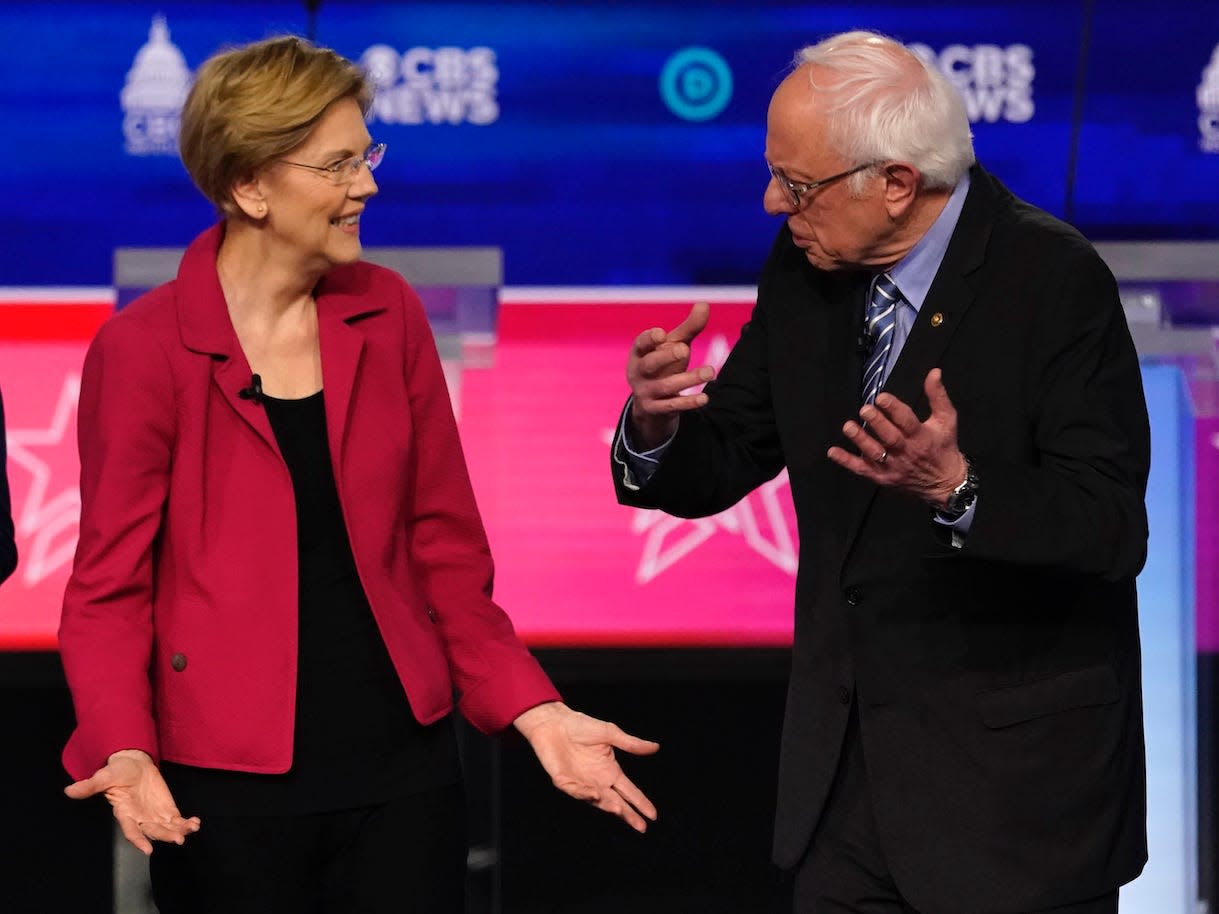Bernie Sanders and Elizabeth Warren want to tax CEOs who make 50 times more than their typical worker

- Oops!Something went wrong.Please try again later.
- Oops!Something went wrong.Please try again later.
Bernie Sanders and Elizabeth Warren are part of a group that introduced a bill to tax CEOs.
Similar initiatives have already brought in, or could bring in, millions for cities like Portland.
The bill comes as some billionaire CEOs have seen huge gains in wealth throughout the pandemic.
Several legislators - including Sens. Bernie Sanders and Elizabeth Warren - announced on Wednesday that they're introducing a bill to raise taxes for companies where top executives are paid 50 times more than their median workers.
It's called the "Tax Excessive CEO Pay Act," and, according to a press release, it's targeted toward tackling corporate greed. Sanders and Warren are introducing the bill with Sens. Ed Markey and Chris Van Hollen, as well as Reps. Barbara Lee and Rashida Tlaib.
"At a time of massive income and wealth inequality, the American people are demanding that large, profitable corporations pay their fair share of taxes and treat their employees with the dignity and respect they deserve," Sanders said in a press release. "That is what this legislation will begin to do."
The legislation is targeted at larger public and private companies; only those with "with average annual gross receipts of at least $100 million for the three preceding years" would be subject to the tax.
Companies where CEOs make between 50 and up to 100 times the median worker's pay would have their corporate taxes increase by 0.5%. For those CEOS paid between 100 times and up to 200 times more than the median worker, taxes would increase by 1%, with a 1% increase for every order of 100. The highest increase would be 5%, for companies where CEOs make over 500 times their typical worker.
The legislation was discussed on Wednesday during a Senate Budget Committee hearing, chaired by Sanders, called "The Income and Wealth Inequality Crisis in America." The hearing also discussed unionization efforts by Amazon workers in Alabama.
Sarah Anderson, the Global Economy Program Director at the Institute for Policy Studies (IPS), testified at the hearing about the CEO and worker pay divide.
"What this bill would do is it would change the incentives by encouraging corporations to share their wealth - and discourage the outrageous CEO paychecks that have led to outrageous CEO behavior," she told Insider.
Some cities have already implemented similar measures
Anderson highlighted that the city of Portland, Oregon has had a similar initiative for years. NBC News reported that that tax penalty brought in about $4 million in 2018, and it was projected to bring in a similar amount in 2019. It also inspired some skepticism from academics in the area, according to NBC News, with some saying it didn't raise significant revenue or bridge a wealth gap.
San Francisco also passed a similar tax as a ballot measure in November 2020, which was projected to bring in around $60 million to $140 million a year. According to the press release, the bill could raise up to $150 billion in 10 years.
Anderson said, "I think we can send a message about our national priorities and values through our tax code and other public policies." She framed the disparity between CEO pay and their workers as a self-esteem and morale issue, with frontline workers - like those working at grocery stores - not being rewarded for the work they're doing.
The bill also comes as some billionaire CEOs have seen huge gains throughout the pandemic, with American billionaires adding $1.3 trillion to their collective net worths since March 2020.
"I think that a lot of people just haven't ever thought about the fact that we are the richest country in the world. And so why can't we get rid of poverty?" Anderson said. "And I think, unless we get rid of the concentration of so much money and power at the top, we won't be able to get rid of poverty because it means that so much of our nation's resources is flowing upwards."
Read the original article on Business Insider

